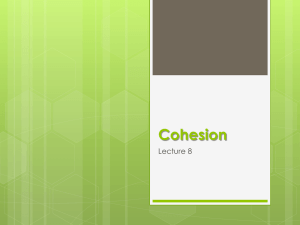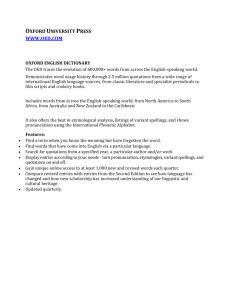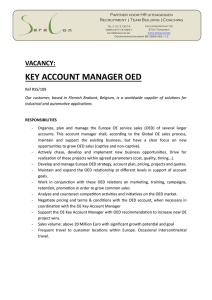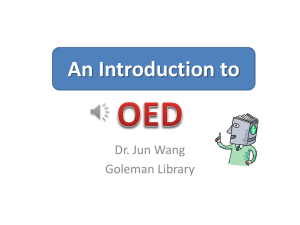File - Laconic Linguist
advertisement
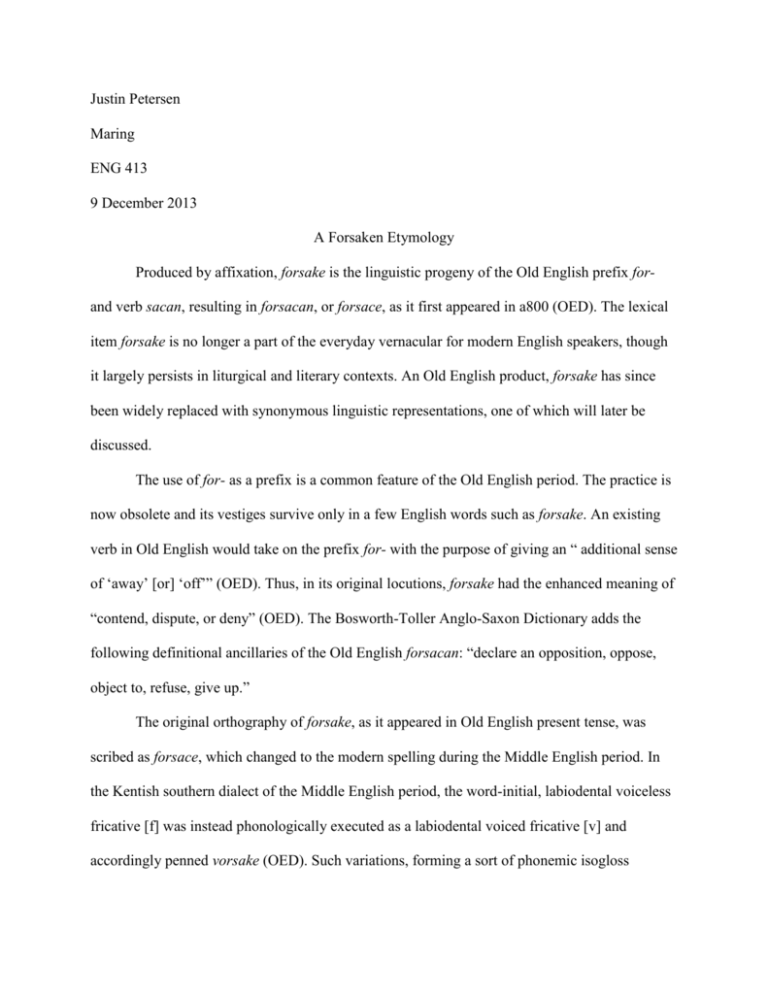
Justin Petersen Maring ENG 413 9 December 2013 A Forsaken Etymology Produced by affixation, forsake is the linguistic progeny of the Old English prefix forand verb sacan, resulting in forsacan, or forsace, as it first appeared in a800 (OED). The lexical item forsake is no longer a part of the everyday vernacular for modern English speakers, though it largely persists in liturgical and literary contexts. An Old English product, forsake has since been widely replaced with synonymous linguistic representations, one of which will later be discussed. The use of for- as a prefix is a common feature of the Old English period. The practice is now obsolete and its vestiges survive only in a few English words such as forsake. An existing verb in Old English would take on the prefix for- with the purpose of giving an “ additional sense of ‘away’ [or] ‘off’” (OED). Thus, in its original locutions, forsake had the enhanced meaning of “contend, dispute, or deny” (OED). The Bosworth-Toller Anglo-Saxon Dictionary adds the following definitional ancillaries of the Old English forsacan: “declare an opposition, oppose, object to, refuse, give up.” The original orthography of forsake, as it appeared in Old English present tense, was scribed as forsace, which changed to the modern spelling during the Middle English period. In the Kentish southern dialect of the Middle English period, the word-initial, labiodental voiceless fricative [f] was instead phonologically executed as a labiodental voiced fricative [v] and accordingly penned vorsake (OED). Such variations, forming a sort of phonemic isogloss Petersen 2 between the south and the midlands, are scarce as forsake has maintained much of its phonemic and morphological structure through periods of linguistic reconstruction. Morphologically manifested, the past tense forms of forsake between the Old and Middle English periods are more visible than those of the present tense of the same periods. These differences classify forsake as a strong verb, given that the past tense is achieved through derivational and not inflectional morphemes, though some weak forms do exist. Conjugating from the present to the past, the rhyme, or root vowel, of the morpheme /sac/ in the root sacan shifts to /sóc/, clips /an/, and results in forsóc (OED). In the Middle English period, forsake conjugates to its 15-16th century past tense form forsook (OED). The shift from /sóc/ to the high and back lax vowel in /sook/ reflects, through transcription, a common shift in vowel pronunciation that took place between the Old and Middle English periods. Both of the Middle English present and past tense forms of forsake are extant in Modern English. Phonological and morphological changes are more readily and concretely identified and studied than the linguistic aspect of semantics. “Semantic changes are notoriously difficult to classify or systematize, and we have no tool comparable to the historical grammar to help us judge what is or is not likely or plausible” (Durkin 222). With this in mind, a solution for semantic analysis is to turn to the documentation of the written word. Forsake appears in the c1400 English translation of Mandeville’s Travels: “Seynt Peter forsoke our Lord thries” (OED). A popular citation of Christian tradition, Mandeville enlists the use of forsake to describe what is modernly referred to as Peter’s denial. The modern use of denial is more strongly recognized juxtaposed with the antiquated forsake, perhaps simply because of the proliferation of the former across popular English vernacular. Petersen 3 Between the time of John Mandeville and the original King James Version of the Bible two centuries later, the word deny appears in place of forsake. The 1611 translation reads, “Iesus answered him, Wilt thou lay downe thy life for my sake? Uerily, verily I say vnto thee, the Cocke shall not crow, til thou hast denied me thrise” (King James Bible, John 13.38). The 1769 Oxford Edition also uses deny to describe the apostolic act. The etymological relationship of forsake and deny is of particular interest when considering the Middle English adoption of French terms. Roughly nine hundred words were added to the English language from French, most of which were associated with the church. Deny entered English in the beginning of the 14th Century, roughly 1300 (OED). It joined its lexical countrymen in liturgical purpose defined as, “say[ing] ‘no’ to a statement, assertion, doctrine” (OED). In the case of a French word entering where there was no lexical gap, one of two events occurred: either a French or English word was cut from the lexicon, or the two began to differentiate semantically. Forsake and deny have, at some undetermined point, intersected and taken on the semantic value of its seemingly synonymous counterpart. The Old English rooted forsake narrows semantically to pious proclivities, appearing almost exclusively in Biblical text and congregational conversation. The 19th Century writing of historian Thomas Arnold provides the following example of the narrowed lexical item: “Nor that the doctrine of Christ crucified and Christ risen, has been so forsaken” (OED). Meanwhile, the French hailing deny expands from describing dogmatic departure to boast greater linguistic currency and contemporary utility. The writing of Hawthorne from the same century as Arnold illustrates this commonly accepted sense of refusal or rejection, “Where everybody begs, everybody, as a general rule, must be denied” (OED). Petersen 4 An additional note on the semantic properties of forsake is found in its binary Biblical role. Arguably one of the most influential documents since its translation in the language, the Bible has a command, as it were, on the employment of forsake. Old Testament verse is commonly viewed as containing the “hell, fire, and damnation” side to religion. The following verse from the 1611 translation illustrates the pejorative connotation of forsake: “And the spirit of God came vpon Zechariah the sonne of Iehojada the priest, which stood aboue the people, and said vnto them: Thus saith God, Why transgresse yee the commandements of the Lord, that yee cannot prosper? Because yee haue forsaken the Lord, he hath also forsaken you” (King James Bible, 2nd Chron. 24.20). If the commandments are not kept, then the individual can count on God’s abandonment. The sense of forsake in this verse is to be left alone and without aid. The New Testament shows God in a different light, as illuminated in the following verse: “Let your conuersation bee without couetousnesse; and be content with such things as yee haue. For hee hath said, I will neuer leaue thee, nor forsake thee” (King James Bible, Hebrews 13.5). Forsake takes on an ameliorated sense in this line of scripture. Where the Old Testament use of the verb incites a sense of fear in the reader, the New Testament fosters a sense of peace and tranquility in the believer. Both utterances carry the same meaning, though their respective contexts unwrap a new layer of semantic versatility. The 1769 Oxford Edition of the King James Bible reveals identical usage to the 1611 translation of the word forsake, both its weak past participle form in 2nd Chronicles and the present tense found in Hebrews. In addition to the Bible, the tradition of forsake has taken a literary path, appearing in works of the great English authors. Petersen 5 Two such examples are accessible in Chaucerian and Shakespearian prose. Chaucer’s 1374 translation of Boethius provides a hyphenated instance of the word in question, “I ne may nat for-sake the rhyt swyfte cours of my prosperite” (OED). A line from Shakespeare’s 1594 narrative poem, The Rape of Lucrece, reads, “For himselfe, himselfe he must forsake” (OED). Personal conjecture asserts that, much like the original emphatic use of the prefix for- in Old English, modern utterances of forsake are to achieve a similar dramatic effect. Now in the 21st century, the use of forsake has essentially disappeared outside the realms of print. Saying forsake rather than deny, as is common in modern vernacular, results with inquisitive glances for the archaic choice in parlance. Though understood in most social circles, forsake takes its emphatic linguistic residence in Biblical and classical literature. Petersen 6 Works Cited "Deny, v." Oxford English Dictionary. Oxford University Press, 2013. Web. 7 Dec. 2013. Durkin, Philip. "Semantic Change." The Oxford Guide to Etymology. Oxford: Oxford UP, 2009. 222. Print. "For-." Oxford English Dictionary. Oxford University Press, 2013. Web. 7 Dec. 2013. "Forsake." Oxford English Dictionary. Oxford University Press, 2013. Web. 7 Dec. 2013. "'for-sacan' - Bosworth–Toller Anglo-Saxon Dictionary." 'for-sacan' - Bosworth–Toller AngloSaxon Dictionary. N.p., n.d. Web. 09 Dec. 2013. The Official King James Bible Online. N.p., n.d. Web. 7 Dec. 2013. <http://www.kingjamesbibleonline.org/1611-Bible/>.



